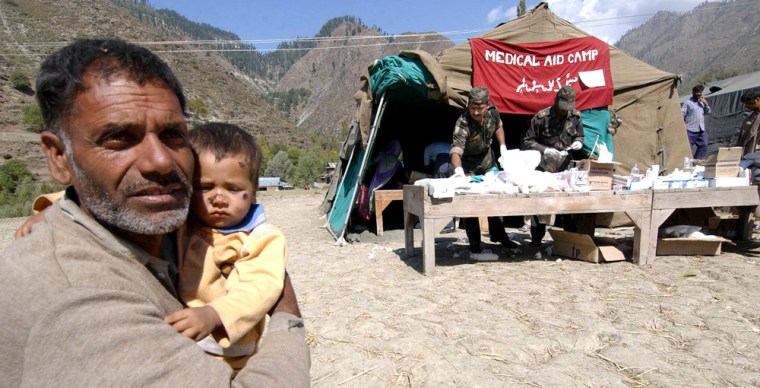Angry villagers blocked roads in earthquake-ravaged regions of Indian-controlled Kashmir on Sunday, complaining the government was too slow in getting rescue and aid efforts to them.
Hundreds were known dead from the 7.6-magnitude earthquake that rocked South Asia on Saturday and rescue workers and soldiers were still pulling bodies from wreckage in the frontier Tangdar region, 65 miles north of Srinagar, summer capital of Jammu-Kashmir state.
While the worst of the quake’s devastation came in neighboring Pakistan, where tens of thousands were reported dead, damage was severe in parts of Jammu-Kashmir.
Collapsed houses and shops line the streets in towns and villages nestled in Tangdar’s deep valleys as well as in the towns of Uri, Punch and Srinagar. Hundreds of people were injured.
Most people spent the night in the open, lighting fires with wood pulled from fallen houses to keep warm in near-freezing temperatures. After mosques announced warnings of another quake over loudspeakers, hundreds of Kashmiris spent Sunday night outdoors.
People jumped out of their beds and hurried into the streets, holding their children. “I don’t want to take a chance. What if there is a quake?” asked Atiqa Bano, a terrified 65-year old housewife.
‘Share your grief’
Sonia Gandhi, head of India’s governing political alliance, visited Uri on Sunday and talked with some of the injured in hospitals.
“We have come here to share your grief,” she said.
Gandhi told reporters the immediate aim was to provide food and shelter, especially tents and blankets.
“The requirement is 40,000 blankets and tents so that those who have lost their houses get a shelter over their heads,” she said.
The Indian army has flown in planeloads of medicine, food and drinking water to the worst-hit Baramulla district, said Jammu-Kashmir state’s chief secretary, Vijay Bakaya. More than 1,000 tents were being distributed in remote villages flattened by the quake.
However, many people said they had received no help.
A crowd of some 200 people blocked the main road between Baramulla and Uri for about 45 minutes, demanding that journalists and soldiers with relief supplies go to their mountainside villages, which they said were being ignored.
“Everything is destroyed. The ground shook and took everything down,” said Syad Hassan, pointing toward the peaks surrounding the valley road.
The quake killed at least 65 people in his home village of Namala and three neighboring hamlets, he said, but no aid had been provided to them.
“All the government people, the press people, they are just driving past,” he said.
Kashmir’s finance minister, Muzaffar Hussain Baig, said the government was doing its best.
“The quake caused a lot of damage to infrastructure and communication. And the weather also became bad, which hampered relief temporarily,” he said, referring to heavy overnight rains.
Mud, debris and knee-high slush from landslides blocked roads, cutting off many remote villages.
Baig said the government had canceled vacations of officials, especially doctors, to bolster relief efforts.
Doctors on foot
“There might be some places where delays have occurred, but officials are also humans,” he said.
Teams of doctors and Red Cross volunteers were traveling by road and on foot to remote areas in the mountains to provide emergency medical care, said Bakaya, the chief secretary.
The assurances made little difference to Farid Khan, a farmer in Jabla, a village about 70 miles north of Srinagar visited by an Associated Press correspondent.
“No one has come to help us,” Khan said. “Yesterday, we buried 20 people in the village, including my five-year-old daughter. We don’t know how many more people are lying under the debris.”
Khan watched helplessly as his wife writhed in pain on a cot nearby, her ribs broken when their home collapsed.
